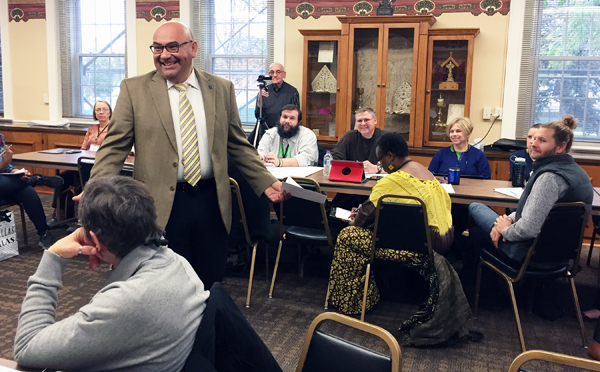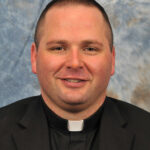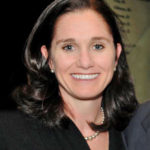By Barb Arland-Fye
The Catholic Messenger
DAVENPORT — Forty-eight adults of different ages, backgrounds and interests listen as their instructor explains the goals for the second session of the Mottet Leadership Institute, being held at the Davenport Diocese’s headquarters. Participants hope this eight-week institute will equip them with the leadership skills necessary to foster positive change in their communities and organizations. Breaking out of their comfort zones is a first step.

Instructor Juan Soto shares a light moment with participants in the Mottet Leadership Institute at the Diocese of Davenport’s headquarters in Davenport on Oct. 28. The eight-week institute aims to equip participants with the leadership skills necessary to foster positive change in their communities and organizations.
At the Oct. 28 session Juan Soto, senior trainer for the Gamaliel Network, tells the future organizers that they are in training to empower their communities. The first step is exploring what motivates self-interest. The challenging process “requires me to deal with my true self,” as one participant reflected.
The Mottet Leadership Institute is part of the legacy of the late Msgr. Marvin Mottet. The diocesan priest dedicated his life to addressing the root causes of injustice and empowering those impacted by it to bring about change. “Father Mottet,” as he was known, died in 2016, but not before securing a promise from colleagues that they would carry on his work and equip the next generation to lead. Fr. Mottet relied on the Gamaliel Foundation, established in Chicago, to develop organizers to lead social justice efforts. Several instructors are alternating as trainers for the Mottet Leadership Institute.
During the second class, Tania, a participant, asks Soto how to choose from among her self-interests, how to merge the issues she cares about. Her primary self-interests are foster care and adoption. “Why?” Soto asks. “I saw a need,” responds Tania, a foster and adoption support services coordinator. Soto insists that Tania probe deeper. “If you are clear about your self-interest, it will guide you,” he says.
The trainer splits the class into small groups to share their self-interests with one another before sharing them with the full group. A Spanish-speaking mom identifies her self-interest as learning to speak English and furthering her education so that she can get involved in the Parent Teacher Organization at her children’s school. Not specific enough for Soto. The mom needs to better understand why and how she will get involved in PTO.
Ruth, a participant from Clinton, aspires to be part of an organization similar to Quad Cities Interfaith. Soto asks probing questions to get to the root of Ruth’s self-interest. She explains that she sees many students and families who struggle with poverty and uncertainty in the school where she works. She sees injustice and wants to do something about it.
The only way to address injustice is to have anger,” Soto tells the group. “I’m talking about cold anger.” “What is cold anger?” a participant asks. “Appropriate emotional response when a value is violated,” Soto responds. “It’s not about sparks, it’s about connections.”
Another participant talks about her vocal support of the DREAM Act of 2017, bipartisan legislation that would provide 800,000 young adult undocumented immigrants like herself with lawful, permanent residential status on a conditional basis. She’s beginning to have doubts about being so public.
“What’s holding you back?” Soto asks. “My fear,” she says. “When I give speeches I am afraid people will take it the wrong way.” Soto offers no sugar coating. “There are consequences if you are going into the public arena, so don’t do so blindly,” he advises the class. “I want you to be strategic. Think about what you need to do and who you need to be in relationship with.”
Learning about someone else’s self-interest is essential to building relationships. That starts with one-on-one directed conversations. He demonstrates with a participant named Melissa. She and her fellow students then practice one-on-one interviews with each other.
One of the day’s final lessons addresses the difference between public and private relationships. Some participants admit that it’s difficult to see the difference. “Usually in a public relationship, there’s a contract,” Soto says. “We’re training to build power through a set of relationships.”
Father Dan Dorau, parochial vicar of Our Lady of Victory Parish in Davenport, said he had no preconceived notions entering the institute. “I was interested in social justice and community action is a big part of that.” The concepts presented so far have been enlightening and sometimes disturbing, he added. He is particularly interested in how the institute will help him in his focus on issues of faith.
“It’s my faith values that drew me here and my involvement in church,” said Ruth Nelson of Clinton. She sees injustice in the way children and families living in poverty are treated. “We’ve got to be a part of changing policies.”
“We’re encouraged to think outside the box,” said Ethelene Boyd of Davenport. The Mottet Leadership Institute is “requiring me to deal with my true self.”
“I love watching the people involved in the training starting to bond with each other,” observed Loxi Hopkins, an institute mentor and colleague of Fr. Mottet. She is positive that he “is smiling down and blessing this class.”
The institute is challenging, she said. “There is new terminology to learn, such as the meaning of the word ‘power.’ Some people grab onto one word or one part of the training and become very negative.”
Hopkins added: “It is important that we continue to train leaders in our parishes to be able to carry out the social teachings of our Catholic faith. Charity should be given short term. People need to become empowered to lift themselves out of poverty or other oppressive situations.”











